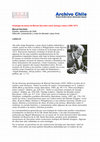Papers by Robert S . Pierre

In his Notes Towards an Autobiography, in 1971, Georg Lukâcs looks back on his youth and the begi... more In his Notes Towards an Autobiography, in 1971, Georg Lukâcs looks back on his youth and the beginning of his intellectual interests: Not my life in any immediate sense. Only want to show how (in human terms) this particular intellectual tendency, this mode of thought (this behaviour pat tern) emerged into life from life ... how personal characteristics, inclinations, tendencies, given the maximum opportunity to develop-according to cir cumstances-have become socially typical, or, to (my present way of think ing) have developed in accordance with the species or have striven to achieve species being. In this passage Lukâcs refers to the multiple possibilities of his social sit uation, which was changed by historical necessity and contingency. Our perspective on Lukâcs' life and interests partially follows this sociological perspective. Research on Lukâcs-the book by Michael Lôwy1 and the book by Andrew Arato and Paul Breines2-adopts the approach of looking at Lukâcs' course of life as a paradigm of development, his radicalisation as a consequence of historical and social conditions in Hungary. The latest book by Ferenc L. Lendvai,3 The Young Lukâcs, shows that the work of the young Lukâcs, his models and ideas of his pre-Marxist phase before 1918, before he joined the Hungarian Communist Party, was incorporated in much of his later work. 'To achieve species being' characterises the way Lukâcs defines his trajectory as an individual in the larger context of the human species. This introduction to a selection of papers on Lukâcs in this issue and the fol lowing issue of Social Scientist links the work of Lukâcs to the intellectual and historical situation in Hungary, and his position in philosophy and intellectual, artistic life. It focuses on Lukâcs' search for a 'novel synthesis' and his wish to connect 'various aspects of individual phenomena ... with broad general substances', that had taken him to the evolution of the main themes of his philosophy. The introduction highlights the main issues in the young Lukâcs' philosophy, such as culture, modernity, freedom, individual, community, universality and history, and attempts to present a social and political landscape of Hungary at the turn of the nineteenth and the first quarter of the twentieth century. In the early phase of his work
Este estudio de los m ovim ientos históricos de vanguardia (futurism o, dadaísm o, prim er surrea... more Este estudio de los m ovim ientos históricos de vanguardia (futurism o, dadaísm o, prim er surrealism o) es un lúcido análisis del efecto social de arte en nuestro tiem po. Y adem ás, constituye el principio de una teoría crítica de la literatura, ya que los m ovim ientos históricos de vanguardia se cuestionaron radicalm ente por prim era vez el papel del arte en la sociedad burguesa. Esta teoría de la vanguardia, que el autor desarrolla en polém ica con las tesis de Benjam in y Adorno, facilita el instrum ental teórico necesario para entender las tentativas vanguardistas de transgredir los lím ites del arte institucionalizado.

Manuel Sacristán España, septiembre del 2006. Selección, presentación y notas de Salvador López A... more Manuel Sacristán España, septiembre del 2006. Selección, presentación y notas de Salvador López Arnal. Lukács (I) «Ha sido Jorge Semprún, cuyas obras Lukács admiraba y citada, quien ha visto a Lukács y Wittgenstein como figuras representativas de la crisis cultural de la Europa previa a 1914. Encuentro bastante revelador el hecho de que algunas de las más notables manifestaciones de los pensadores españoles hayan sido bajo la forma ensayística. El ensayo es también la forma literaria más lograda de Lukács porque encarna de manera concisa y dramática las ideas dominantes del momento. Como Unamuno, Lukács es un gran maestro del ensayo dramático-lírico. En los ensayos de El alma y las formas, Lukács estaba tan a sus anchas como Unamuno en las calles de Salamanca.»-Arpad Kadarkay, Georg Lukács. Vida, pensamiento y política, pp. 11-12.-De las diversas aproximaciones de Manuel Sacristán (1925-1985) a la obra de G. Lukács cabe destacar: "Sobre la noción de razón e irracionalismo en G. Lukács",

Prolegomena ausgehen, zugleich jedoch auch darüber hinausgehen, um das Sein als echtes Ansich erf... more Prolegomena ausgehen, zugleich jedoch auch darüber hinausgehen, um das Sein als echtes Ansich erfassen zu können. Man muß jedoch zugleich auch die unerläßlichsten Mittel der gedanklichen Bewältigung des Seins auf Grundlage ihrer einfachsten seinsmäßigen Beschaffenheit permanent kritisch betrachten. Die Wechselbeziehungen dieser beiden scheinbar entgegengesetzten Gesichtspunkte ermöglichen erst eine Annäherung daran, was Sein wahrhaft als Seiendes ist. Daß diese Wechselwirkung bis jetzt so gut wie niemals wirklich in richtiger Weise bewußt gemacht wurde, liegt teilweise an der Simultaneität von richtigen und falschen Tendenzen seiner beiden Komponenten, teilweise, ja oft in erster Reihe, daran, daß die Menschen die hier zu erreichende richtige Lösung nicht direkt gesucht haben, sondern zufällig fanden, indem sie bestimmte, gerade aktuelle ideologische Bedürfnisse zu befriedigen versuchten. Wenn wir jetzt und später in breiteren Zusammenhängen von Ideologien sprechen werden, so müssen diese nicht im Sinne des heute allgemein üblichen irreführenden Wortgebrauchs verstanden werden (etwa als von vornherein falsches Bewußtsein über die Wirklichkeit), sondern so, wie sie Marx im Vorwort zu »Zur Kritik der Politischen Ökonomie« bestimmt hat, nämlich als Formen, »worin sich die Menschen dieses Konflikts« (nämlich der aus den Grundlagen des gesellschaftlichen Seins aufsteigenden) »bewußt werden und ihn ausfechten«.' Diese umfassende Bestimmung von Marx-und das ist das wichtigste Moment ihrer weitreichenden Verwendbarkeit-gibt auf die Frage der methodologischen und sachlichen Richtigkeit oder Falschheit der Ideologien gar keine eindeutige Antwort. Beides ist praktisch gleich möglich. So können die Ideologien in unserem Fall sowohl eine Annäherung an das Sein wie eine Entfernung davon bewerkstelligen. Jedenfalls spielt aber in der Geschichte unseres Problems die konfliktschwangere Interessiertheit der Menschen daran, ob ein für sie wichtiges Moment ihres gesellschaftlichen Lebens als seiend oder bloß scheinend betrachtet werden soll, eine große Rolle. Und da solche Ideologien, besonders in Krisenzeiten der Gesellschaft, zu echten geistigen Mächten heranwachsen können, ist ihr Einfluß auf Problemstellung und-lösung in der theoretischen Frage nach dem Sein ein beträchtlicher. Unter der ablenkenden Kraft derart wirkungsvoller Faktoren ist es kein Wunder, daß eine den Tatsachen wirklich entsprechende ontologische Begründung des Denkens der Welt immer wieder auf Irrwege geleitet werden mußte. Wir sprechen gar nicht vom Mittelalter, wo diese Lage (ontologischer Beweis des Seins Gottes)

Cofites, pp. 296-297. Subrayado del autor. Esta limitación del método a la rflilidad íiistórico-s... more Cofites, pp. 296-297. Subrayado del autor. Esta limitación del método a la rflilidad íiistórico-social es mny importante. Los malentendidos que ha sns-dlÉclo n la manera engehiana de exponer la dialéctica provienen esencialmente d« nu« EnmeU-sÍRiiiendo el mal ejemplo de Hcgel-extendió el método dlilpcHci) ll^ conocimiento de la naturaleza; siendo así que las determina-Í l^no* íí<ii?l«lv«» de)a dlnWrtica; arción rwíproca entre suieto y obieto, uni-|Íljlfpl|i k'l«Qria y la prtxti, modificnción hiatórica del sustrato de las cate-I Trthaitt tualariado y eapiud. * Mt (mpM, 1, f. 580, Himbnri», 1914. '' Ver el eniayo «La cosiflcadin y la conciencia del proletariado». * MI eapüal, I. p. 541. * Acerca cl« IB» razones de ese estado de cosas, yer el ensayo sobre «Conciencia de clo»«». * B*|0l. Ptlmcipi»» (U filosofía del derecho, Galliíaard, 1940, S46 y S47. * Mnnc, L» sanrada fatniliM, t. II, E^ Gastes, pp. 62-6S. ' Uil/ardiai, El capital firumcier*. * Sobre la relación entre Hegel y sus sucesores, ver el notable estudio del hegeliano Lassalle La lógica de Hegel y la de Rosenkranz, Obras, Ed. Cassirer, tomo VI. En cuanto a la medida en que Hegel llevó su propio sistema a construcciones falsas y cómo fue profundamente corregido y deoisivamenle prolongado por Marx, ver el ensayo «¿Qué es el marxismo ortodoxo?». El capital. I, p. 41. Subrayado del autor. Ver también Engels, Eí origen de la familia, la propiedad privada y el estado. 2 El capital. I, p. 731. Ver también Trabajo asalariado y capital. Acerca de las máquinas, Miseria de la filosofía, cap. II, § 2. Acerca del dinero, Ibid., cap. I, § 3 A. ' Dokumente des Sozialismus, II, p. 76. 1_ A partir de este pnnto es desde donde podemos adquirir una comprensión históricamente correcta de los grandes utopistas, como, por ejemplo, jPlatón o Tomás Moro. Ver también en El capital. I, pp. 26-27 acerca de Aristóteles. 2 «Lo que no sabe, lo dice a pesar de todo», escribe Marx acerca de-Franklin. El capital. I, p. 17. Ver también en otros pasajes: «No lo saben, pero lo hacen», Ibid., I, p. 40, etc. • Salarios, precios y ganancias.

We both knew fu ll well that, however seriously he took them, these three reasons simply represen... more We both knew fu ll well that, however seriously he took them, these three reasons simply represented a deeply buried human need whose articulation had now become historically possible. When he returned to Hungary fr om Romania in 1957 Lukacs had written to the Hungarian Socialist Workers Party, saying that he continued to regard himself as a member. He never received a reply to this letter. Obviously no one had the courage to sign a let ter expelling him even at the time when the propaganda campaign against him was at its height. 'I have stuck in their throats ,' was Lukacs's description of such situations: 'They can 't swallow me and they can't spi t me out. ' Later he read in the official encyclopedia that he had been expelled fr om the party. The encyclopedia article had been written by a fo rmer pupil, J6zsef Szigeti. 'He only had one idea that he hadn 't stolen fr om me, and that was that I ought to be pensioned off, ' was Lukacs 's opinion of him. The encyclopedia article cannot be regarded as an official reply. AI though Lukacs joked about it, there is no doubt that he fe lt slighted. He needed to be accepted by the party. 'My party, right or wrong' seems a strange sentence in Childhood And Early Career lnteroiewer: I think it will be best if we proceed chronologically. I should like to use Gelebtes Denken as a starting point. Lukacs: In my own view my development advanced step by step and so I would agree that a chronological approach is the best since all the events in my life are closely linked. So the only logical place to begin is in fact at the start of the process. lnt: The first two sentences about your childhood run as fo llows: 'Of pure Jewish fa mily. For that very reason: the ideologies of Judaism had no influence whatever on my spiritual development. ' I don 't understand why you say 'for that very reason '. G.L. : The Leopoldstadt fa milies were completely indiffe rent to all religious matters. Religion only interested us as a matter of family convention, since it played a certain role at weddings and other ceremonies. I do not know whether I have already told the story about my father fr om the early days of the Zionist movement. He said that when the Jewish state was established he would like to be made consul in Budapest. In a word , we all regarded the Jewish fai th with complete indiffe rence. lnt: Do I understand fr om this that you lived in Leopoldstadt? Where exact ly? G.L. : I did not actually live in Leopoldstadt, but in the Andrassy Street district. At Andrassy St. 107 and, later, at Nagy Janos St. 11. lnt: So the term 'Leopoldstadt ' stands really fo r a social group? G.L.: The area around Andrassy Street used to lie on the edge of Leopoldstadt. It was where the Leopoldstadt upper crust lived. /nt: There is a reference here to another anecdote: 'Story about Nanny.' G.L. : The story points to something important. I completely rejected everything to do with the rules of conventional behaviour. In my view this even included contact with uncles and au nts. My mother claims that as a child
Capítulo sobre Marx de la ONTOLOGÍA DEL SER SOCIAL de Georg Lukács
Capítulo sobre Hegel de la ONTOLOGÍA DEL SER SOCIAL de Georg Lukács.
No sé quién se tomó el trabajo de escanear y subir primero este texto a la red, pero lo comparto ... more No sé quién se tomó el trabajo de escanear y subir primero este texto a la red, pero lo comparto porque es un trabajo clave en la comprensión del lugar de la subjetividad en el ser social.
Textos escogidos de la obra de Gramsci 'Cuadernos de la Cárcel'.








Uploads
Papers by Robert S . Pierre
El conocimiento debe ser patrimonio de toda la humanidad. Comparta todos los libros que quiera, pero cuando pueda compre el libro original.
Knowledge should be the heritage of all humanity. Share as many books as you want, but whenever you can, buy the original book.